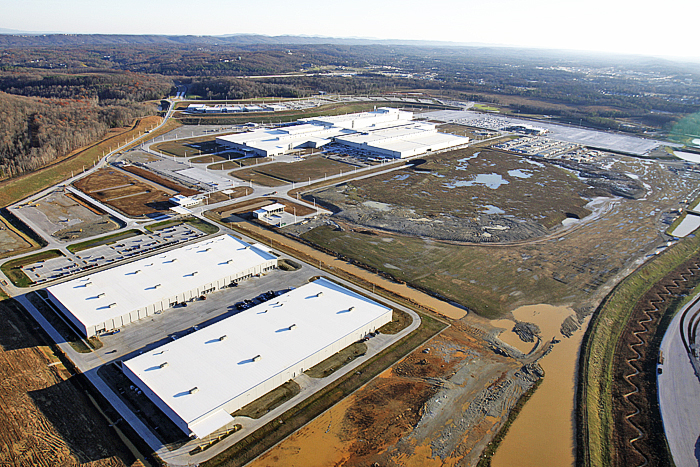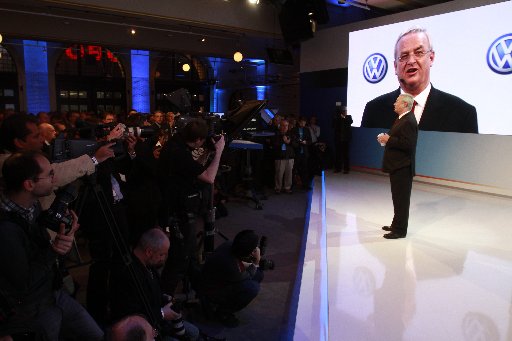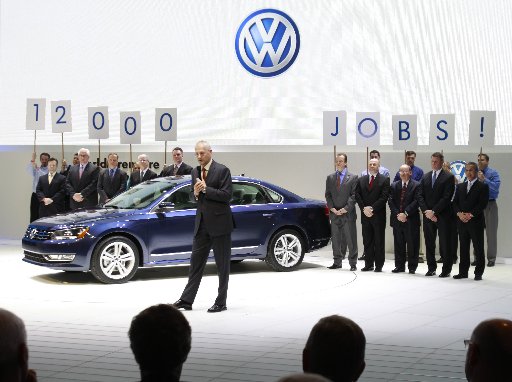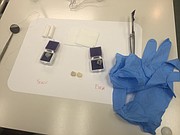Chattanooga and VW have a lot riding on Passat
Sunday, January 16, 2011
To introduce its first U.S.-built vehicle in 23 years last week, Volkswagen produced a video with the ultimate American icons -- two cowboys riding over a mountain to discover the sprawling new Chattanooga VW assembly plant.
As they ride through the Utah mountains before cresting a hill to see the new 2 million-square-foot plant in Chattanooga, one cowboy questions the other about whether Volkswagen is really here to stay.
"This time, I tell you, I think it's for real," the baritone voice rider tells his skeptical partner.
Billed as "Here and Real," the video underscores Volkswagen's $1 billion investment in Chattanooga and what company officials say should be a long-term commitment to the Scenic City and the American car market.
Tom Balya, the 53-year-old chairman of the Westmoreland County Commission in Southwest Pennsylvania, recalls hearing similar words from the German automaker in 1978 when VW opened the first modern production plant by a foreign carmaker in the United States. Less than a decade later, however, Volkswagen shut down its 2.5 million-square-foot complex near New Stanton, Pa.
To view the entire edition of 2011 Volkswagen Unveiled Click Here.
VW said slumping sales of its Golf hatchbacks and Rabbit cars made in Pennsylvania, combined with unfavorable currency fluctuations, made VW's maiden venture with U.S. production unprofitable in the 1980s.
"Volkswagen came in with a lot of fanfare, and we were all excited about the plant and nearly 5,000 jobs it helped produce for our area," Balya said. "But unfortunately, it didn't work out, and Volkswagen made a business decision to close the plant in 1987. That's the nature of the economy we live in."
Jonathan Browning, a former executive at both General Motors and Ford Motor Co., was hired last year to head Volkswagen of America and insists the carmaker is approaching the American market differently this time.
The Chattanooga assembly plant built to make 150,000 vehicles a year -- and perhaps three times that number if it expands in the future -- is a key part of that strategy, he said.
"Somewhere along the way, we lost our bearings," Browning told reporters last week as Volkswagen unveiled its American-built Passat at the North American International Auto Show in Detroit. "Those days are over. We intend to rebuild our position in the United States."
Volkswagen is the world's third-biggest carmaker and has set a goal of becoming the global leader in auto sales in the next decade.
But for all its international success, its U.S. vehicle sales peaked in 1970. After its early success with its iconic Beetle and Microbus, VW's sales fell for most of the past decade before rebounding strongly last year.
Volkswagen sales in 2010 rose twice as fast as the U.S. industry average, but VW still captured only 3.1 percent of the U.S. market.
Frank Fischer, president of Volkswagen in Chattanooga, said VW wants to triple its U.S. sales by 2018 and that the Chattanooga plant will play a key role in helping to both customize a product for the American market and demonstrate the company's U.S. commitment.
Volkswagen's Chattanooga plant that will produce the Passat is part of a $4 billion investment in America.
During an unveiling of the Chattanooga-built Passat last week, VW workers held up five numerical signs highlighting the 12,000 American jobs Volkswagen will generate from its plants, suppliers and supporting businesses in the United States.
Driving for success
Volkswagen and Chattanooga both have a lot riding on the success of the new Passat.
Michelle Krebs, a senior auto analyst at Edmunds.com, called the VW vehicle introduction last week "perhaps the most important of any" at the Detroit auto show because of its importance in growing Volkswagen's market.
"This certainly marks a huge milestone in the history of Volkswagen in the United States," she said. "Volkswagen has very lofty goals to sell 1 million Volkswagen and Audi vehicles by 2018, and that is a very big stretch from where they are today."
State and local officials also bet big on the investment. To lure Volkswagen and thousands of new jobs to Chattanooga, local, state and federal governments collectively agreed two and a half years ago to put up the biggest incentives package ever to land a U.S. auto plant.
Part of what grew into the record $577 million package of tax breaks, infrastructure investment and property and training assistance was made even before Volkswagen announced its decision to build at the Enterprise South industrial park.
Former Gov. Phil Bredesen agreed even before he took office eight years ago and before there was a firm automotive prospect for the site to fund a $23 million exit on Interstate 75 at exit 9, now known as Volkswagen Drive. When Volkswagen folks seemed to show a preference for the flat soybean field in Huntsville, Ala., over the still-wooded and hilly site at Enterprise South, Bredesen offered $500,000 of state funds to clear the site.
A month later, Volkswagen picked Chattanooga over Huntsville for the auto plant.
Bredesen insists the investment will pay off because he expects Volkswagen to not only be successful with the Passat but with other future models made in Chattanooga.
Among the 20 largest business investments in Tennessee during Bredesen's term, 17 came from businesses already operating in the state, the governor said. Two of the biggest came from Japanese automaker Nissan, which has expanded its Smyrna factory and relocated its North American headquarters to Franklin, Tenn., since it began producing cars in Tennessee in 1983.
Over the next decade, Volkswagen and its local suppliers are projected to pump more than $1 billion into the area's payroll. Those wages and related VW purchases and investments will multiply into thousands of other jobs in the community, according to projections from the University of Tennessee's Center for Business and Economic Research.
The I-75 interchange built two years ago to recruit Volkswagen to Enterprise South also proved pivotal last year in luring Amazon.com to build a $91 million distribution center at the same exit.
Chattanooga advantages
Supporters of the new VW plant insist that Chattanooga has several advantages over the facility VW scrapped in the 1980s in Pennsylvania during its last attempt at U.S. production.
In New Stanton, Pa., Volkswagen took over an abandoned Chrysler plant and operated under a United Auto Workers contract at a time when U.S. labor costs were higher than those at many VW plants elsewhere in the world. The new Chattanooga plant was built especially for Volkswagen and is designed to accommodate changes in product lines.
Volkswagen plans to produce about 50,000 vehicles in Chattanooga this year and will ramp up to 150,000 vehicles in the next few years. But Browning said production could be expanded in Chattanooga up to 500,000 annual vehicles in the future.
The city and county gave nearly 1,300 acres in Enterprise South to Volkswagen, and the automaker has an option for 1,200 more acres if it chooses to build other plants.
Tennessee also paid for a $40 million training center in Chattanooga to help prepare workers for jobs in the Chattanooga plant, which currently is nonunion.
David Cole, chairman emeritus of the Center for Automotive Research in Ann Arbor, Mich., said currency and wage changes over the past generation often make production in the United States less expensive than in Germany.
Volkswagen in America* $4 billion: Investment in America for the new Chattanooga assembly plant, the new North American headquarters in Herndon, Va., development of the new American-made Passat and an expanding dealer network* 3,000: Corporate, subsidiary and regional employees, including 1,200 in Chattanooga* 800: Volkswagen dealers* 30,000: VW dealer employees* 9,500: More supplier-related jobs predicted from the Chattanooga plant* 11: Regional dealer support officesSource: Volkswagen of America
Cole predicts if Volkswagen's Passat stays priced just over $20,000, "I think it will be very successful." Cole said building the Passat in Chattanooga reduces by about half the model's $100-per-hour labor cost in Germany.
"The cost of German labor is huge," he said.
Adapting to change
Three years after Volks-wagen shuttered its New Stanton plant, Pennsylvania managed to recruit Sony into the former VW facility. The Japanese electronics company employed 3,000 workers making televisions in the plant -- and spurred jobs at up to 1,100 related businesses in the region -- at its peak, Balya said. Sony eventually phased out the plant and closed it in March 2009.
Since then, about 500,000 square feet of the vacant 2.5 million-square-foot facility has been leased to a solar panel manufacturer and a bar coding materials maker.
"We're working to find other tenants, but that can be a challenge with a facility this big originally designed for a single use," he said.
Balya urged Chattanoogans "to enjoy Volkswagen and hope their investment lasts as long as possible.
"The reality is the market is going to determine their future here so you should hope you see a lot of Volkswagens around town," he said.
Staff writer Mike Pare and The Associated Press contributed to this report.
To view the entire edition of 2011 Volkswagen Unveiled Click Here.






